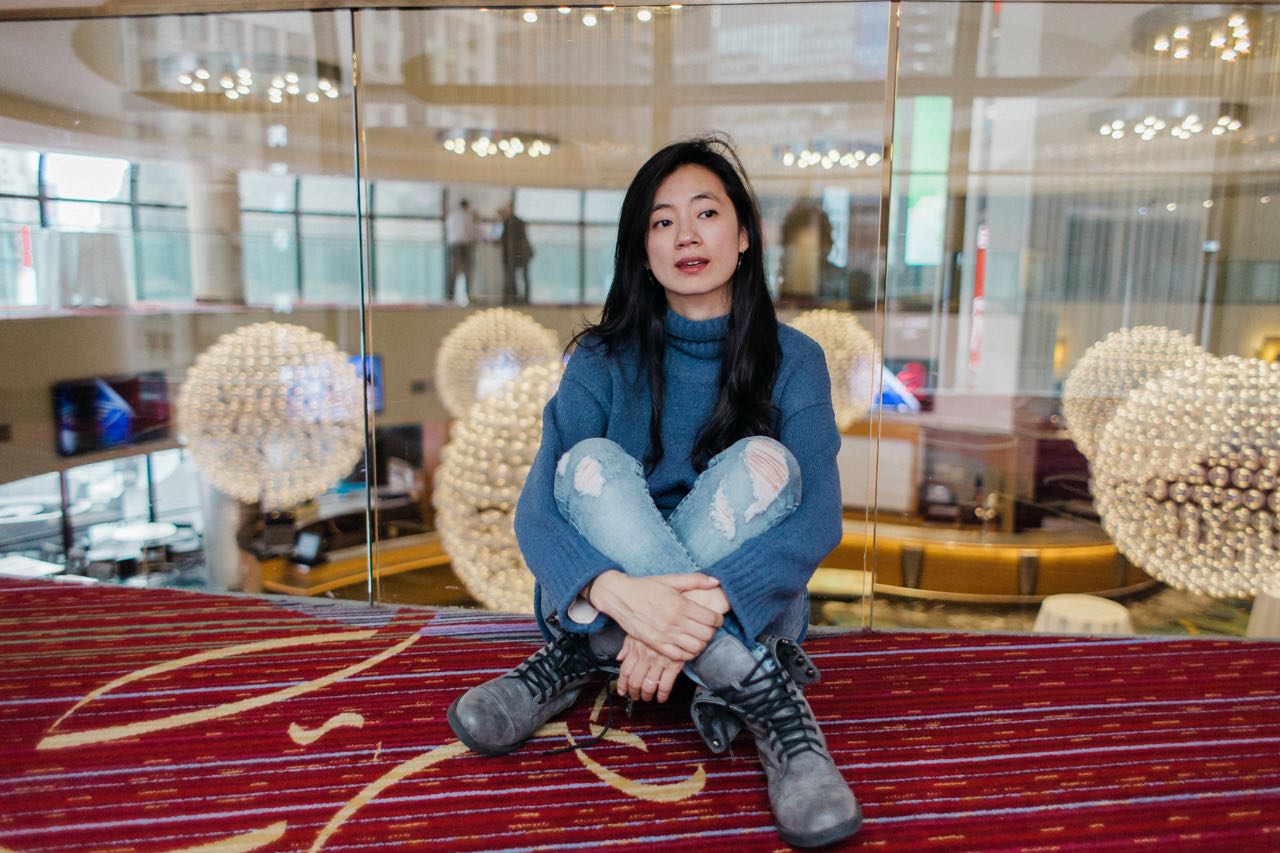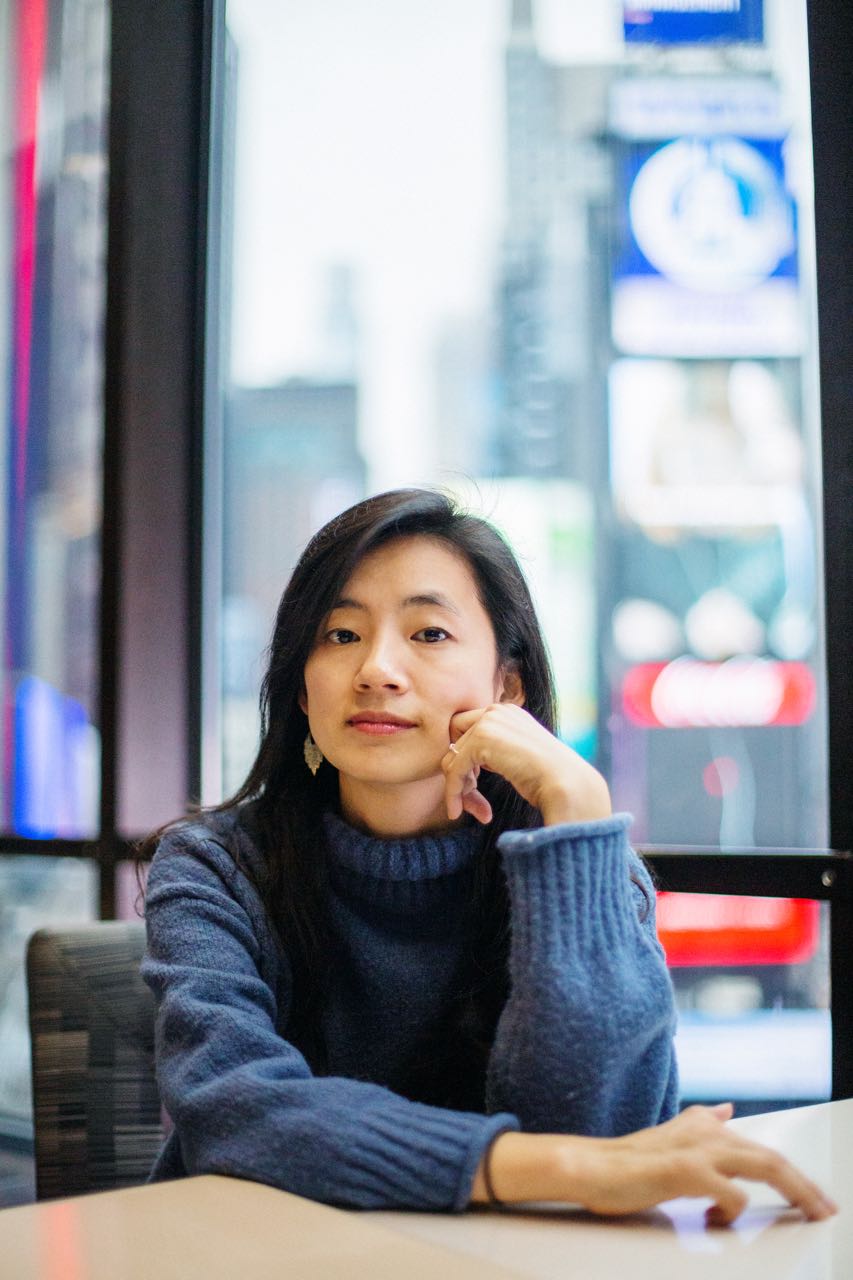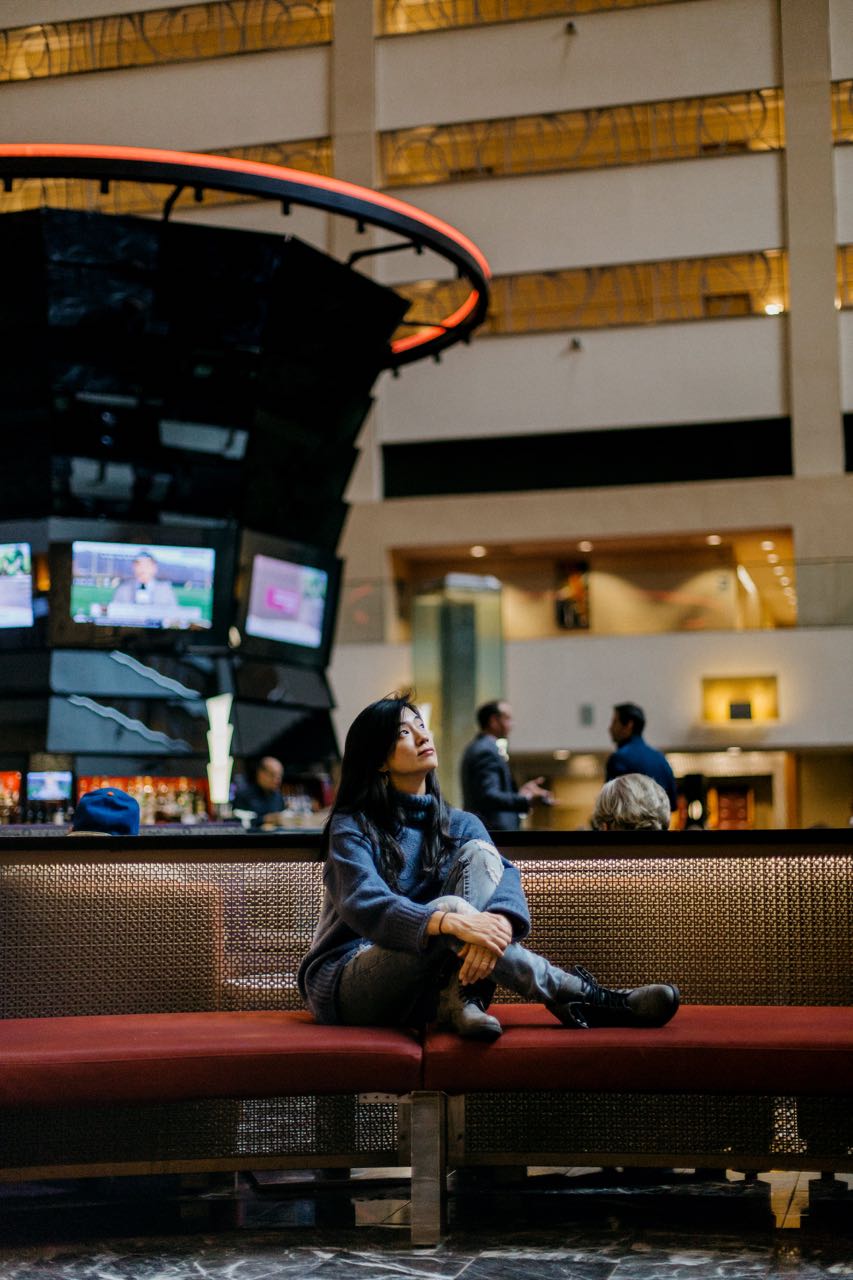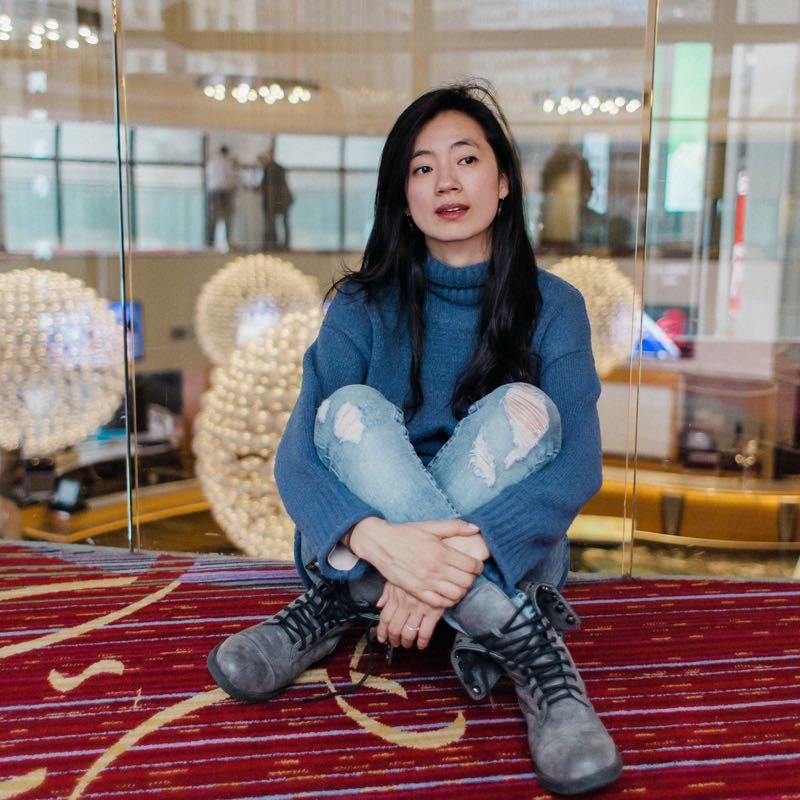Wild Goose Dreams with Hansol Jung

November 19th, 2018
In playwright Hansol Jung’s world of glorious magical realism, the Internet is portrayed by people singing in binary code and fathers turning into penguins who have lost their wings. Those are only two of the many-layered metaphorical components that make up her new show, Wild Goose Dreams, currently playing at The Public Theater, directed by Leigh Silverman. In its most literal sense, Wild Goose Dreams is a romantic story depicting the connection between North Korean defector Nanhee and South Korean Goose Father, Minsung. (A Goose Father is someone who stays behind in Korea, making money to support his family, while his wife and children move to an English speaking country for the sake of the kids’ education.) But despite the budding relationship between Nanhee and Minsung, this play is not a typical love story. Their experience highlights how the desire to connect, especially in a globalized society aggressively fueled by social media, can sometimes lead to isolation and heartbreak instead. I recently spoke with Hansol about the thematic importance of communication, the inherent musicality of her plays, metaphors on stage, and more.
Let’s start by talking a bit about you as a writer, and your own sense of global identity. Growing up, you moved around a lot and experienced several different cultures. Did that influence the way you tell stories and create characters?
I totally think so. I was born in Korea, and then went to South Africa, and then I moved back to Korea, but I went to school in the States. So, I don’t have a very concrete sense of what it’s like to have rootedness in community. I think I write about that a lot; almost every one of my plays has someone who is not [living] where they were from. But I don’t think that I can claim that that’s my thing. It’s so prevalent in our society now; who lives in the place where they are from? When you are in a place where you don’t have a claim to the culture, you’re always a little bit on the powerless side, in that you’re always looking for cues, and whatever you do, you’re checking back to see if it’s okay. I have a lot of habits of self-awareness that are sometimes helpful, sometimes not. I think I write those habits into those displaced characters without really thinking about it. If you’re from North Korea and you’re in South Korea, this is what you’re doing. It’s just a natural feeling I have.
How do you approach language in the world of your plays, especially for a piece like Wild Goose Dreams, where you’re writing in English about Korean characters?
It was interesting how I found the language and syntax rhythm for how Wild Goose Dreams is written. I wrote the first thirty pages in Korean, and then translated it into English. In that way, I found a different syntax that lifts it out of ordinary, colloquial English. But there’s also a lot of colloquial English, of course, for the storytelling and pacing and all that. It was fun to find little tweaks of Korean metaphors that, translated into English, feel fresh.
You initially pursued a Master’s degree in directing at Penn State. What sparked your transition from directing musicals to writing plays?
It was very specifically directing for musical theatre. And there were not a lot of [shows] for me to do that [allowed me to] really speak from my heart. I started writing while I was in grad school for directing. It was such a relief to be able to write my stories, and have people do them, versus trying to wring out my version of My Fair Lady.
You also used to translate American musicals into Korean. Did your background as a translator prepare you for becoming a playwright?
Completely. I went through a lot of structural rigor trying to translate [shows] without any agenda. [I learned] how things work; it becomes a rhythm. The “I want” song always happens here, this is how many people are in the final song, and this is how the plot is supposed to carry on. I’ve done forty of them, so I deep read a lot of musicals. And I think the musical sense of how a play moves is still very important to me in my writing.
Even though you’re not writing musicals, there’s a lot of musicality in your plays.
Yes. I need to hear it before I know what it is, and I think that has to do with the musicality. And I was also maybe trained this way at Yale. Also, I don’t know how write plays without songs. I’ve tried really hard to not have songs in my plays, but it’s such a helpful device.
What function do you see songs as having in your plays?
A lot of the time, I use them to lift people out of reality, or to economically give a sense of joy that you cannot give in text. Joy, euphoria, connectedness, just something lifted up from the banal.

In Wild Goose Dreams, a lot of the music is performed by a Greek chorus type ensemble, which also serves as a personification of technology and social media. Can you talk about the significance of that choice? Were you consciously referencing and reimagining certain theatrical traditions, like the trope of the Greek chorus?
Not consciously. I think it’s just that I’ve learned what I’ve learned, and I’ve read what I’ve read. I just want to write this version, this experience. I’m sure it was influenced by that, but I’m not thinking, “What do I know, and what technique can I use to do it?” I’m always just panicked and grappling in the dark of how do I make this entertaining? It has to be felt for me, or it feels didactic or it feels too tried. I needed to give the aural experience of being on the Internet, or having a crutch for the emptiness, and soul-sucking loneliness that people feel. When you’re scrolling down on the feed, you see people, not the Internet’s binary codes. You don’t see the algorithm; you see the human face of what that was. The idea was to bombard the characters with other human voices, and other very lived sounds, which then makes you feel lonely, because you don’t have any of that. I think that was my experience with scrolling, or emailing. When I get texts or notifications, it feels like connection, because it’s another human, but it’s not connecting with me, it’s just bombarding me.
Has writing this play made you want to use screens less?
Yes. It makes me want to get a flip phone, get off the grid and never come back. Live in MacDowell [Artists’ Colony] forever, if they will have me.
What about some of the other metaphorical elements of the show? For instance, how did you go about developing Nanhee’s dreams and father hallucinations?
[It was] once I discovered that the play felt like a two hander. The Internet world was Minsung’s world. It’s the thing that makes him unable to be a human functioning properly in the society. Once that structure became clear, Nanhee needed to have a version of that, distorting her sense of being where she is. So then it was the dreams as physical manifestations of, again, something ephemeral, like the Internet, which has an emotional impact for her, so she can’t actually connect with Minsung. People always ask, so I’m going to preemptively tell you, about the penguin. One version of the goose father is a penguin father. It’s because penguins cannot fly; they are the poor goose fathers who don’t go and meet their family. They just stay in Korea, and send money, and don’t see their children for years. So, it came from that, and also from emperor penguins. The fathers sit on the eggs, and the mothers go off after they lay them. There’s a father love motif that I went and ran with, and no one understands why the penguins are there, but I do. That’s what’s important.
For all of its metaphysical elements, the play is also grounded in certain specific realities, especially when it comes to Nanhee’s journey. What was it like to research North Korea?
I was surprised. I knew as much as any South Korean would. We have some defectors, and they try to assimilate, but it’s hard. I think I held a lot of biases, and I think my countrymen also hold a lot of biases. In the recent years, since I’ve started writing this play, it has gotten slightly better. But actually reading up on the situation has been really moving. There are defector movements that try to send K-Pop and K-Dramas into the black markets in North Korea; that’s their effort of trying to get to their countrymen. I also was horrified to find out the different expectations of these people. They would get a sum of money when they first defect, and they would get defrauded out of it, and it’s rough. I’m not sure how much of that made it into the play. I’m really hoping that people don’t come away thinking [Nanhee] is mentally ill. It’s just the personification of her feelings of being lonely, and the pressure of the guilt, and feeling unmoored from the society that she’s in, that’s driving her towards a kind of despair that we understand. That’s what I was trying to get at. It was really hard for me to write a North Korean person. I’m not sure if I got it right, but I was trying really hard to make her a human, like me.

We briefly touched on this before, in terms of your own self-awareness and background, but communication is a very important theme in the play. Nanhee struggles to grasp some of the jokes and social cues she encounters in Seoul.
I think that’s maybe my PTSD because I very rarely get jokes. When I say something and people laugh, retrospectively I’m like, “Oh, I made a joke.” Communication, the need to be understood and the elation when you are understood and someone gets you, it’s so big. There are a lot of moments where [the characters] are just not able to understand what’s happening with the other person, but really wanting that very badly, really wanting to understand the jokes and laugh at the right time.
One person with whom you seem to communicate well is Leigh Silverman. Wild Goose Dreams is not the first play of yours that she’s directed. What has it been like for you to collaborate with Leigh?
It’s amazing. She just understands. The way she talks about the people that I wrote, it’s from such a deep understanding. It’s amazing, because we have nothing in common in terms of where we’re from, or culturally. She just has such a profound understanding of the things I try to get at. It’s been such a blessing to have found her so early in my career. And she’s just such a great leader of the room. She’s worked so hard, and pushes me to places that I, otherwise, would not have gone. We’ve become really good friends and really good collaborators. I could just talk about her all day. It’s just been so amazing. A lot of the collaborators I have met have been women, women who are really excelling at their fields. So that means they exist.
Has this growing awareness of women in theatre impacted you as a playwright?
Oh, absolutely. It’s impacted me considerably. You know The Count, right? I think it’s really turned the tide. Almost every play [of mine] has had a production, which would have been insane ten years ago. It’s been quite brilliant. People are really looking for different kinds of stories, and different kinds of storytellers.
This conversation has been edited and condensed for clarity.

